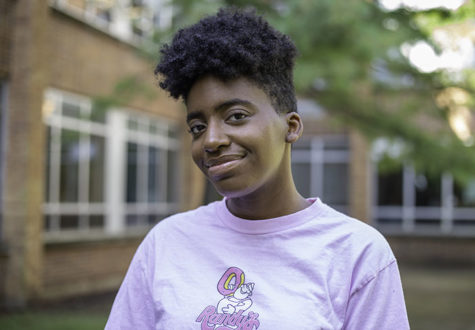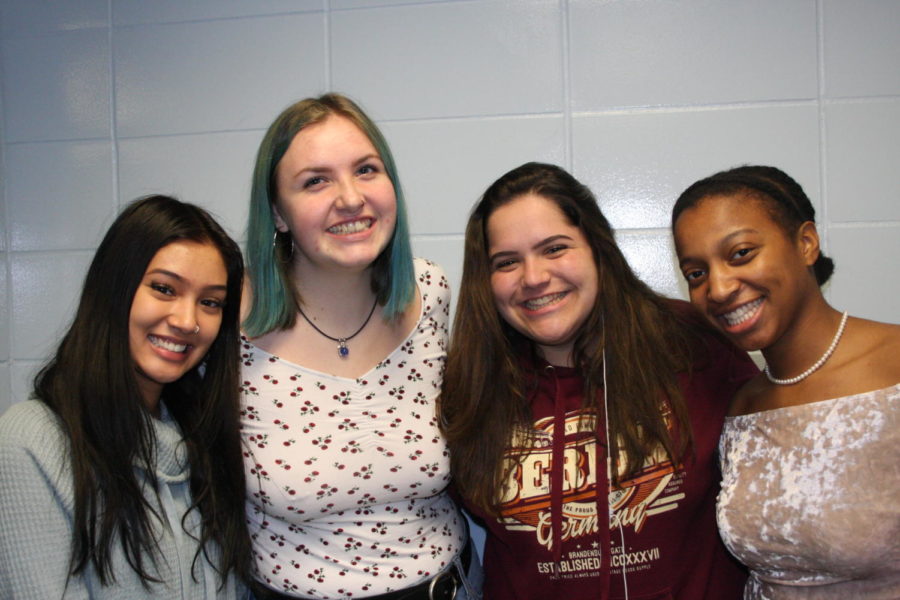DGS captivates the culture
Seniors Scottyln Williams, Catherine Mcintrye, Reese Clemens and Melissa Valmores sit at lunch together every day, sharing their life experiences despite their differences in culture and ethnicity.
When you walk the halls of DGS, you see an array of colors and ethnicities. From Hispanic to Caucasian to Japanese, DGS has a lot to offer when it comes to representing a large amount of the world in their student body.
With clubs like Cultures in Alliance, UMOJA and Kpop, students of all cultures have the ability to engage in activities where they can show their culture to others and allow others to educate them.
Senior and member of Cultures in Alliance Nicole Buelah enjoys the club because they spend their time celebrating all cultures while sharing ideas and customs in a comfortable environment.
“During our meetings we usually have one of our members present their culture with the club or we go on field trips to restaurants from different cultures. I get to learn more about the world around me and share something that means a lot to me,” Buelah said.
A new course called Multicultural Studies in American Society was added to the social studies department and is based around learning about race in America and moving to be more accepting of others and their cultures.
Dr. Christopher Esposito, Social Studies Department Chair and teacher in the new course, believes the class is able to allow kids to question the narratives they have heard about other cultures in order to get rid of stereotypes.
“The beginning of the class is challenging grand narratives. We have to understand the histories of all around the world and not specifically [in the US]. In the United States we have had a single story of U.S history and it is not an accurate story. Once we can realize the complex nature of our history, the more we can realize there is a greater opportunity to create equality throughout the society,” Esposito said.
Senior Sam Selakovich says that she believes it is important to spread this idea of sharing each other’s cultures so that we don’t get stuck in a single narrative proposed by the boxes we can get stuck in.
“I think it is important to show your ethnic background at school because you should be proud of your culture and share great aspects of your culture with others. I show by telling literally everyone I know that I am Polish and then telling them about my favorite ethnic food because everyone loves food,” Selakovich said.
Esposito feels it is important for DGS students and staff to feel welcome and accepted in the school no matter if their culture is common or a part of the many cultural minorities.
“It is important for our students and staff to feel comfortable within their culture and identity. That goes a long the lines of cultural pluralism. I think there can be a problem when we celebrate only a few cultures. So it becomes a responsibility to not privilege some cultures over other cultures. I think it is important that we recognize the beauty of many different cultures,” Esposito said.
Selakovich believes the positive spread of culture throughout America is something that has become an every day in our lives because of the restaurants and music we are constantly exposed to.
“Without Americans being proud of their cultures, we wouldn’t have a choice of going to a Chinese food restaurant or an Italian food restaurant, we wouldn’t have a choice of learning German or French in school, and we definitely wouldn’t be able to listen to ‘Despacito’ on repeat during the summer,” Selakovich said.
Although culture representation is important at DGS, the outcomes of embracing your culture on your own can lead to positivity in many other aspects of life that include at home and in extra curricular activities.
Junior Victoria Opacian goes to Polish school every Friday and this allows her to become even more in-tune with who she is on a weekly basis.
“An actual thing I do to embrace my culture is by going to Polish school on Fridays. It’s a way to embrace and be a part of my culture. Although I think it is just as important to embrace your culture because it defines who you are and what your values you are. Everyone is different in their own way and culture plays a huge component in forming that,” Opacian said.
Junior Monica Cudzich says that culture goes beyond the environments you are in daily but allow you to accept and love who you are by knowing where you came from.
“I definitely think people should embrace their culture because it goes into loving yourself more because you appreciate where you’re from and you’re not ashamed of it,” Cudzich said.
Esposito aims to encourage students to be confident in their identities by making them feel comfortable in the classroom on more than a student teacher connection – but on a personal level too.
“At the very beginning of our class, we just had to talk to each other and break down the feelings of school. We are here because we are interested. We are here because we are people and we are real. We are trying to connect with some of the most basic tenets of human nature and understanding it’s need to be heard will open [students] to tell their stories,” Esposito said.
In our school, trying to be accepted by others can be something that is frowned upon. But Esposito believes that challenging the stereotypical stories people assume about us because of our ethnicity is an action of educating and promoting how important our own stories are.
“Our stories are important and having our stories validated and celebrated is important in all aspects of our lives,” Esposito said.


